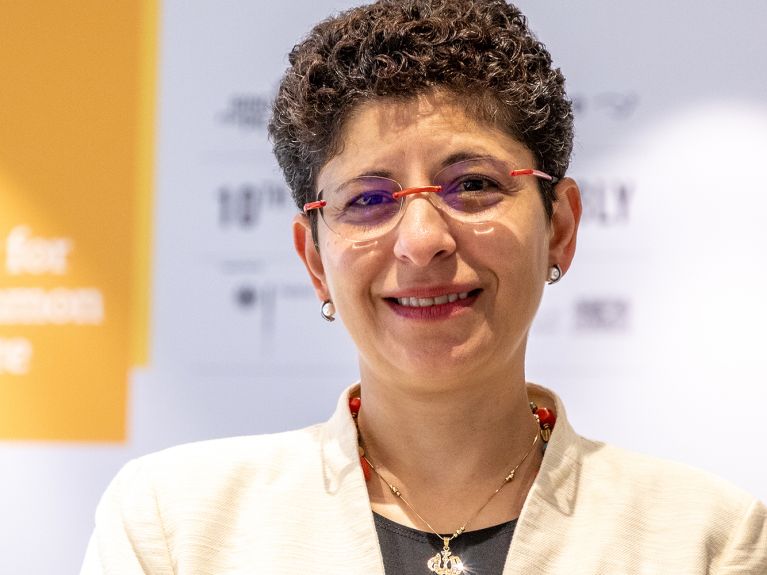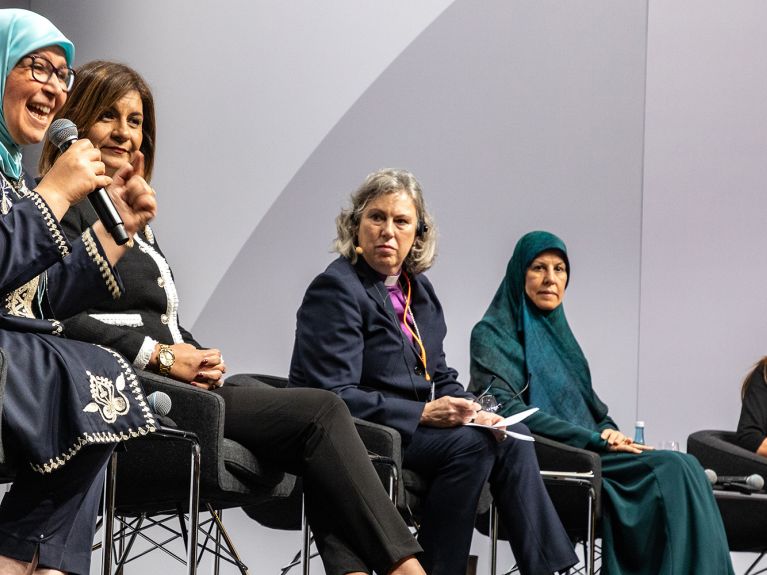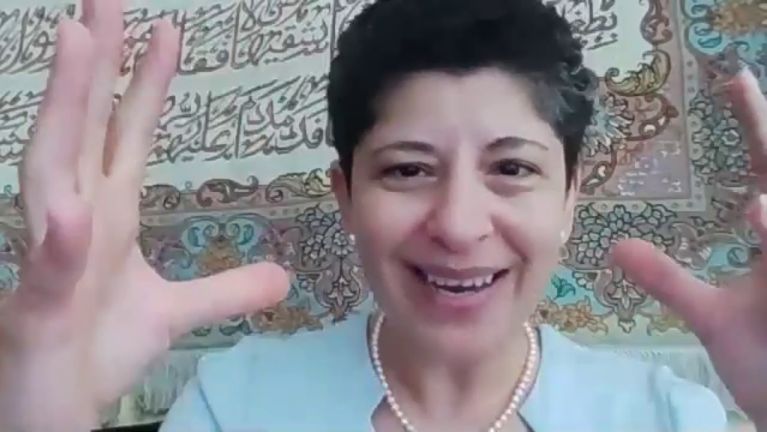“Religion is underestimated”
Azza Karam, Secretary General of Religions for Peace, works for understanding – also in times of the corona pandemic.

“Religion is underestimated in Europe,” says Azza Karam. “It determines the lives of people and entire countries; it is part of all conflicts and also part of the solution.” The political scientist, who was born in Cairo in 1968, has led the Religions for Peace network as Secretary General since March 2020. The non-governmental organisation actively engages in interreligious dialogue for peace.
Azza Karam is convinced that politics does not work without religion – and that here not only people with important titles and high positions have influence, but also people from ordinary life. This includes, for example, women who shape everyday communal life. Azza Karam would like to bring the two worlds together: “Solutions are only possible with one another, not against one another,” she says.
Azza Karam was elected in Lindau in 2019
The beginning of her term of office coincided with the outbreak of corona in March 2020, when many countries declared lockdowns. Azza Karam was elected in September 2019 in Lindau at the first World Assembly of Religions for Peace to be held on German soil. From 10 to 13 November 2020 Religions for Peace will be inviting participants to its next assembly, this time online. It is focusing on women, faith and diplomacy and networking people who hold responsibility. In Germany the organisation works with Stiftung Friedensdialog der Weltreligionen und Zivilgesellschaft, a foundation that promotes understanding between world religions in civil society that is also known as the Lindau-Stiftung. The gathering is taking place within a protected framework in which the dividing lines between religions, groups and interests can be more easily overcome.
Dieses YouTube-Video kann in einem neuen Tab abgespielt werden
YouTube öffnenThird party content
We use YouTube to embed content that may collect data about your activity. Please review the details and accept the service to see this content.
Open consent formThat needs to be explained in Western countries, because there religion is on the decline, unlike in the rest of the world. In all, 84% of the global population describe themselves as religious, and the percentage is rising. However, it is becoming increasingly clear in the Western world that politics has to take religious faith into account. That is why the Federal Foreign Office is working with Religions for Peace and supporting the assembly.
The non-governmental organisation is also known as the “UN of religions” because it would like to bring peace to conflicts with the help of religious leaders. After all, Karam’s office is located opposite the Headquarters of the United Nations in New York, where the organisation has also been accredited since 1973. As the daughter of a diplomat, Azza Karam grew up in the capitals of the world and always wanted to campaign for human rights. She became increasingly aware of how much religion influences people – and how people, for their part, also base their life together on religion and faith. Azza Karam teaches in the Netherlands as a professor of religion and development.
Women with their faith have the competence to resolve conflicts
Azza Karam is the first woman to head Religions for Peace since its foundation 50 years ago. She is supported by various committees and trustees. The 80 members of the World Council include Margot Kässmann, the former German bishop, and Antje Jackelén, the Swedish Lutheran archbishop. Religious faith is the common element. “When I believe a creator made me and others, then I see the world differently,” says Azza Karam. “Then we owe one another respect and love.” How sustainable is this conviction in a present when people commit murder and attempt to justify wars in the name of God? Religions for Peace trusts in the power of encounter, that people who get to know one another and have developed a sense of trust in one another will use the power of their belief together for understanding.
Does that work? Do women without offices change the world? Azza Karam answers with stories – about women in Sierra Leone, for example, who sought contact with extremists and were able to bring abducted children back home again. Or how she herself was involved when women-friendly family law was introduced in Morocco in 2005 – with the votes of Islamist parliamentarians. At the time that was celebrated as a revolution. “Women with their faith have the competence to resolve conflicts,” says Karam. She adds that prominent people at the leadership level are only successful as a result of the efforts of women in everyday life. That is why you have to bring them together.

A special focus on religious relief agencies
However, encounters are almost impossible at present. That is why Azza Karam is seen on screens not only explaining the potential of religion, but also describing reality – firmly and in a friendly way, her gaze directed towards you from behind narrow-rimmed glasses. Onlookers can only deduce the lively hand gestures, because the camera hardly records them.
Azza Karam sums up soberly: “We are living in an era of violence, and religion is very significantly involved in the violence.” Nevertheless, her experience tells her that you cannot counter this by pushing religion back into the private domain, as people have long attempted to do in Europe. It is much better to openly address problems and encourage cooperation. For her that represents a programme against fundamentalism.
Karam has observed, for example, that all religions are working to contain corona: “However, and this almost breaks my heart, they hardly cooperate.” That is why her organisation wants to strengthen contacts between the relief agencies of different religions, for example, though the United Nations Office for the Coordination of Humanitarian Affairs, which was set up in 1991. “The relief agencies of the religions are closer to the people in need than anyone else,” says Karam. “We can help them to help together.”


